Referral Program for Small Businesses: How to Get 10 Referrals from One Happy Customer
1. What is a Referral Program
2. How a Referral Program Can Help You Small Business
3. How to Create a Referral Program
4. Referral Program Incentive Ideas
5. Tips and Tricks for Creating a Successful Customer Referral Program
6. Examples of Small Business Referral Programs
Getting qualified leads isn't easy. And it can be even more challenging if you're a small business that doesn't have a six-figure marketing and advertising budget.
Getting ahead of large businesses and franchises designed to target your best customers is an uphill battle, so you need to find alternative ways to consistently get people introduced to your company and interested in your products.
And that's where creating a referral program for small business can be incredibly effective.
49% of shoppers get introduced to brands or products/services by their family members and friends. For a small business, getting referrals presents a unique opportunity to get in front of new customers and leverage the built-in trust factor referrals offer.
But what is a referral program? And how to create a referral program on a limited budget?
Let's explore everything you need to know about getting ten new leads from just a single happy customer.
What is a Referral Program
A referral program is a way to reward your current customers for recommending your services and products to their family or friends. It's based on offering an incentive to people who can bring in new business from their circle, encouraging current happy customers to share your message and promote your products on your behalf.
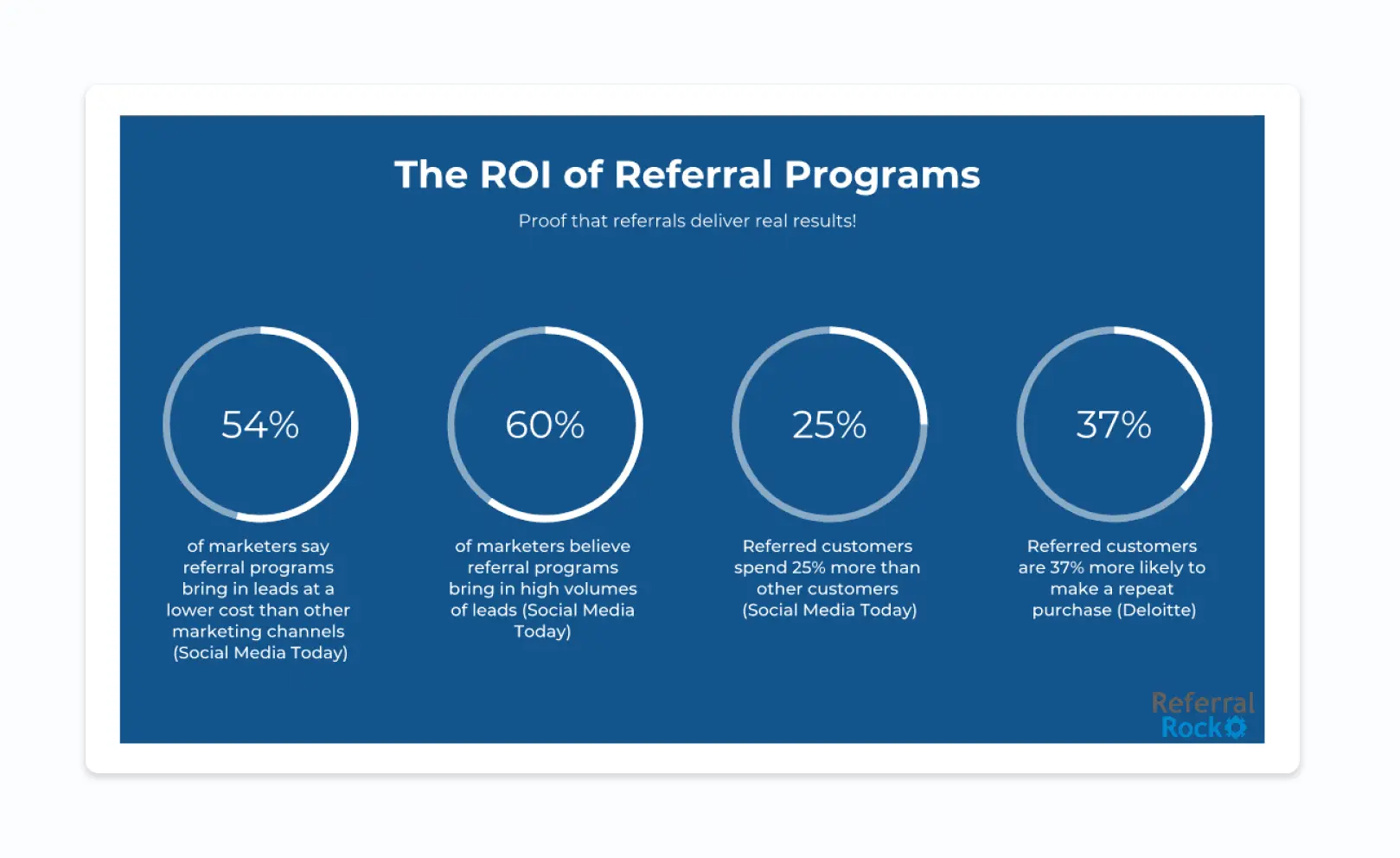
Referral programs don't require much effort from the customer and have a built-in trust factor because it’s a recommendation from people they already know. Because of that, referrals can be one of the most effective ways to grow your small business.
How a Referral Program Can Help You Small Business
Setting up a refer-a-friend program takes time and effort. So, is it worth it for a small business with limited resources?
Here are four compelling reasons why getting referrals is extremely valuable for any organization.
Create a New Stream of Customers
Developing a new method to generate customers for your business is a big challenge. Most strategies do not guarantee success, or that you'll be able to compete against more established players in your market.
But when you set up an effective referral program, you can take advantage of your biggest asset, which is the positive experiences your customers have with your brand. If you can get them to recommend your services, you will start seeing new customers who will be much more likely to stay with your brand in the long term.
Improve Relations with Existing Customers
A less obvious benefit of having a referral program is that it can also improve your relationships with current customers. Having a referral program shows that you appreciate your customers and want to reward them for sharing your message.
At the same time, getting your customers to become your brand ambassadors will increase the likelihood of them sticking around with you for longer because representing your business will become a part of their identity.
Decrease Expenses of Acquiring New Customers
Most paid methods for acquiring new customers take a lot of work to sustain. Even if you can attract leads, you need to convert them for less than they spend on your business. And that can take a long time of tweaking and optimization.
Meanwhile, a referral program for small business can have a fixed low cost for every new customer. And since you can set clear rules for the reward and the rules, you can always come out on top and scale your referral program indefinitely.
Bring More Loyal Customers
Building a long-term relationship with new customers takes time and isn't always possible, even if you do your best to make them happy. But the way that a customer is introduced can have an impact on whether they will stick around for longer.
When someone becomes a customer after a recommendation from a family member or friend, they will already have more trust that your business can actually deliver. Having that initial connection will also make the referrals more likely to stick around with your company. And that makes referred customers not just more loyal, but more profitable as well.
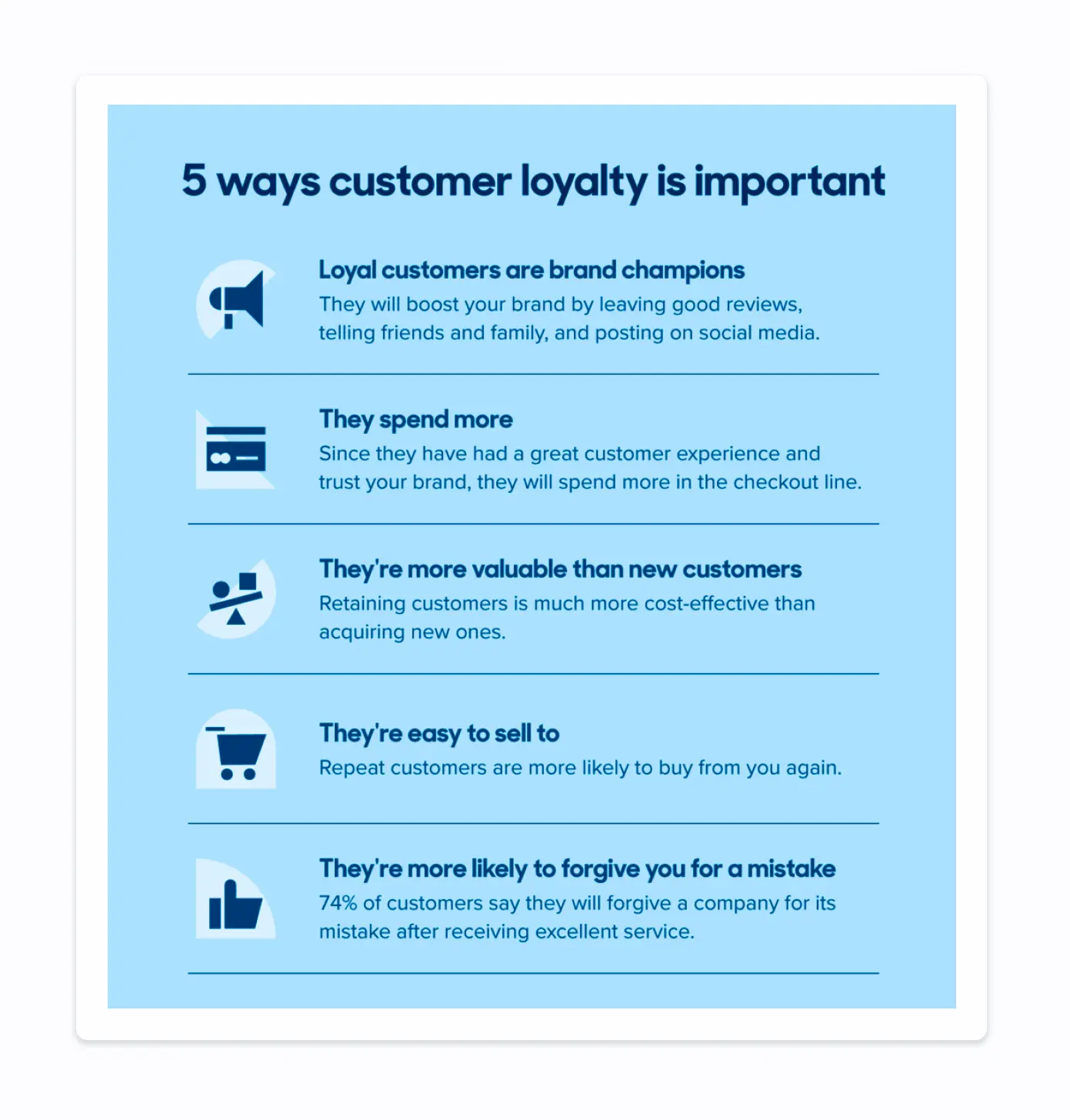
source: Zendesk
How to Create a Referral Program
Creating a referral program can be one of the most impactful steps you take as a small business. But coming up with effective referral program ideas isn't easy, especially when you haven't created anything similar before.
Getting professional help when developing customer referral program ideas offers a ton of value. But it is possible to set up a program on your own if you're willing to invest enough time and money.
Here are the steps you'll need to take to get your referral bonus program up and running.

Define Your Goal
Setting up a referral program involves many steps. And for those steps to have a clear direction, you must first establish what you want the program to accomplish.
The obvious primary goal is to get your products and services in front of people who are likely to be interested. But you also need to consider the specific outcomes you want the program to accomplish in terms of measurable results. Those results could be the number of sales, a specific amount you want the new customer to spend, or even the number of scheduled meetings.
The specific goal should reflect your business type and the biggest value-driving actions that leads and customers could take.
Identify Your Best Customers
Not all referrals are equal. In fact, a referred person that isn't a good fit for your business will only waste time and resources.
And that's why you should be very deliberate about determining the ideal customers you want to attract. Narrowing your focus will help create more personalized and appealing messages that get the most suitable customers to join your referral program.
The good news is that finding out who your best customers are is a relatively simple process. Just look at who your best customers are right now and identify the traits that made them long-term loyal fans of your business.
Find the Right Channels to Run the Program Through
For a referral program to be effective, it needs to be able to function automatically and without you having to manually set up each action. And that's why having the right channel to run the program is probably the most important technical step you need to take care of.
The referral program platform needs to perform a few critical tasks, such as tracking who has received the referral message, who has sent it, who has signed up, and who you need to reward.
This is one area where having a reputable referral program marketing company on your side is really helpful. They can handle all the technical aspects for you, leveraging the best practices used today together with the most effective tools.
Create Your Marketing Campaigns
The success of your campaigns depends on your ability to get in front of the right people who can refer others to check out your business. And that means you need to utilize the right marketing strategies to get your referral program up and running.
Since the best brand ambassadors are usually customers themselves, the most effective approach is to utilize channels you already use to communicate with your customers. Namely, you should create emails, articles, and social media posts that promote your referral program and showcase its value (and the reward).
The key is to find the right time to run these promotions and develop a message that isn't pushy or intrusive. Otherwise, you could risk damaging your relationship with your customers.

Find the Best Incentive
The type of incentive you choose will play a vital role in your referral program’s success. And that’s why you need to be deliberate about how you choose to reward and motivate your program’s participants.
A big factor in choosing the right incentive comes down to your business type. If you’re an eCommerce store, a discount for the next purchase works really well, especially when combined with a first purchase discount for the referral as well.
But for a realtor, a discount is not really possible because repeat customers are rare. In that case, you might not even need an incentive at all, or can go with something more personal like a gift that shows appreciation.
In the end, it comes down to profitability, appeal for your customers, and overall fit with your business. But the good news is that there are many types of incentives to choose from, which I’ll explore in the next section.
Set Up Tracking
Referral programs rely on trust from all parties. As the company, you are responsible for ensuring that every step of the process is accounted for and handled correctly. And that's why you need a way to track and stay on top of everything that happens in your referral program.
You'll need a way to track:
- Who was referred;
- Who referred them;
- Whether they became customers;
- What rewards need to be applied;
- What the next steps will be for the person that's just been referred.
These processes can be automated using the right Customer Relationship Management (CRM) platform. Still, setting everything up to work effectively can be a hassle. And considering the reputational risk of things going wrong, it's usually better to outsource the process to a reputable company that can ensure everything runs smoothly.
Referral Program Incentive Ideas
Finding the right incentive is a crucial part of a successful referral program. Below, you'll find a comprehensive list of options for you to choose from.
- Just Ask for a Favor. For a small business, offering credit or rewards can be expensive. And in some industries, that approach simply won't work because of the types of services that are offered. If that's the case, your best bet might be to take advantage of the good momentum you created by providing excellent service and ask your happy customer to refer someone as a favor to you.
- Run a Contest or Giveaway. Another good approach to limit the amount you would have to spend is to run a contest or a giveaway for a prize. This is also a great option for when you don't have a way to reward current customers on their next purchase. For example, a prize might be a better option if you are a realtor and have few repeat customers you could offer discounts to.
- Offer a Gift. A gift is a great motivator that can get more of your customers to share your offers with their peers. But when using gifts as an incentive, make sure you clearly establish what constitutes a successful referral in terms of the action the new customers need to take.
- Provide a Gift to the Friend. Your customers will need to convince their friends and family members to give your products or services a shot. To make their job easier, it's a good idea to offer a gift to the referral as well, as they will be more likely to take up the offer if they view it as a good deal.
- Referral Discount. Another great way to boost your referral program conversion rates is to offer an initial discount to the person signing up. While this won't work for all industries, it can eliminate a lot of the risk for a new customer while still helping you grow your audience and revenue.
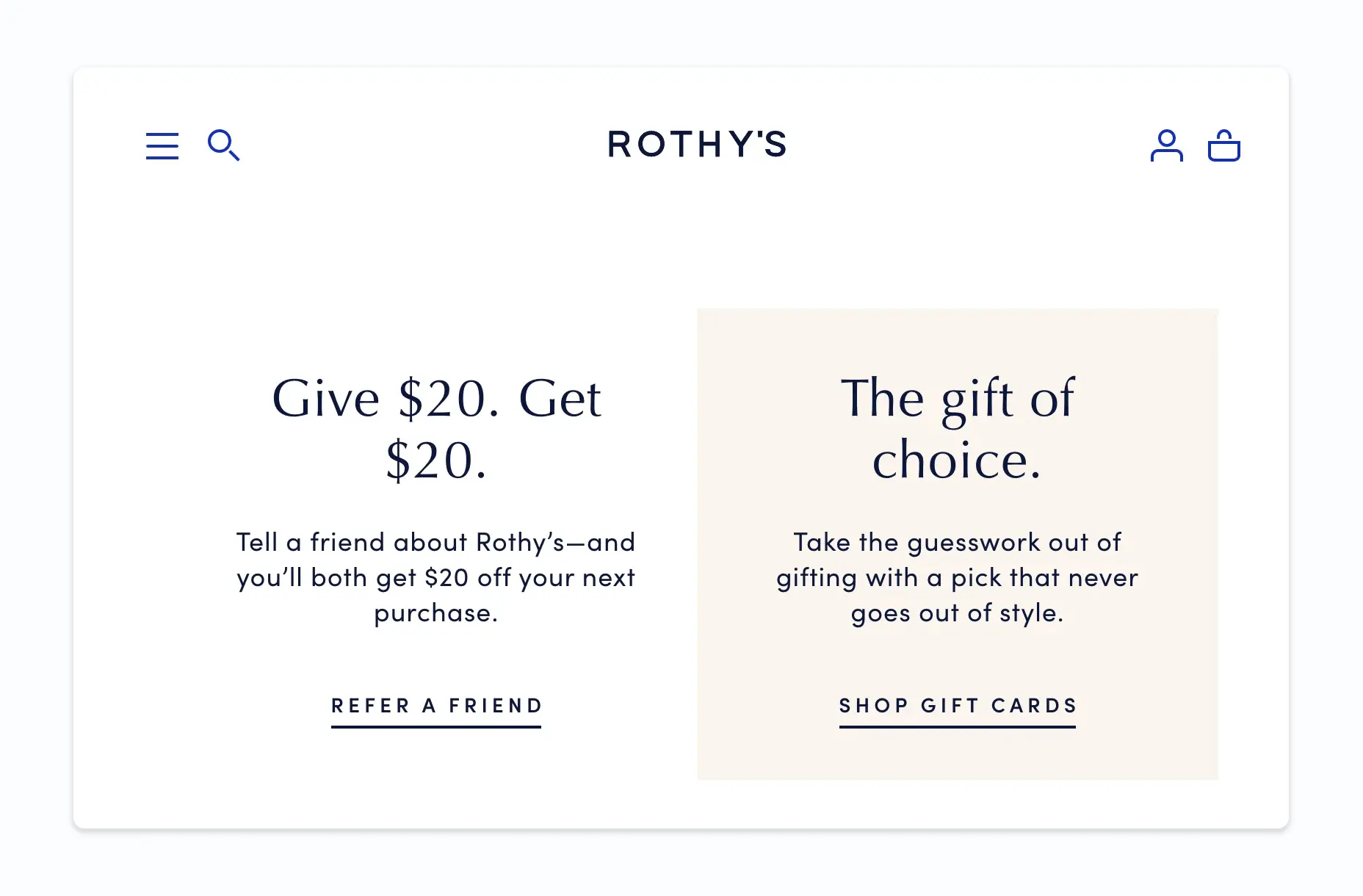
source: Shopify - Progressive Beneficial Tiers. While some of your customers may only refer one or two people, others could have the opportunity to bring in many more. Because these brand ambassadors can be an invaluable source of growth for your business, you could implement a progressive tier-based system that increases the reward for the referrer with each additional tier of referred people they reach.
Tips and Tricks for Creating a Successful Customer Referral Program
If you're still unsure about how to get your referral program up and running, here are a few valuable tips and tricks to get your referral program off the ground.
Make Your Referral Program Clear and Simple
Your customers are busy people. Even if they're very pleased with your products and services, you can't expect them to spend a lot of time figuring out how to join your referral program and share your promotional message with their friends or family members.
That's why your primary goal throughout the program development process should be to make it as straightforward as possible for the participants.
You need a referral program channel that's easy to use, explaining each step while reducing the number of steps to a minimum, and clearly communicating the benefits that both the referred and the referral can expect.
Add a Clear CTA
You need to ensure that your referrer knows exactly what they get when landing on your page. That’s why there can’t be any disconnect between their expectations and real offer that could occur because of vague CTAs like "get started" or "learn more.
Instead, make the call to action as specific as possible, emphasizing the value the referrer will gain when buying from you. That could be a discount, a promo code, a gift, or anything else that enhances your offer or makes it more appealing.
Make It Easy to Share
You can't expect your customers to spend more than a few seconds sharing your referral links. So you need to simplify the task as much as possible and make it a one-click process.
Whether it's copying and pasting a message, sharing a link, or inviting the referral through email, clearly explain the process and add copy/paste buttons where needed.
Use Email Signature Banner Campaigns
A referral program for small business is only going to be as successful as it is visible. And since you probably don't want to spend a lot of money promoting the referral program, it's best to use the channels you already have to keep your best customers informed about the opportunity.
One of the most effective ways to boost visibility is by using an email signature generator. If you use professional email signature management software like Newoldstamp, you can quickly add eye-catching banners to your email signatures, customizing them based on the offer and the communication type.
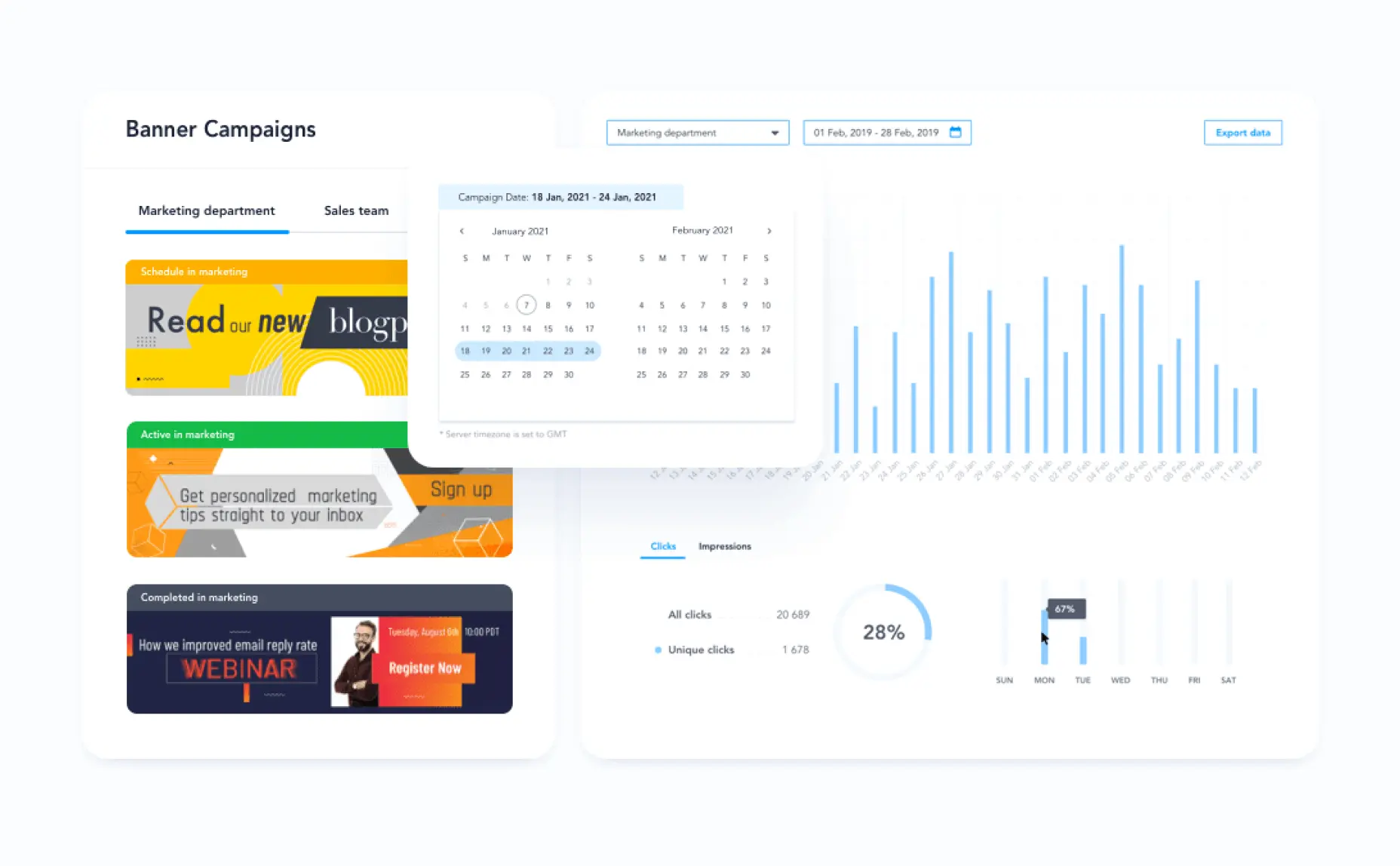
Send Follow-Up Emails Quickly
Just because a customer doesn't refer anyone after the initial email doesn't mean they couldn't do it in the future. But for that to happen, you need to be persistent and send follow-up emails that emphasize the different benefits they get from becoming your advocate. Email automation makes it easier to maintain that persistence without manual effort, ensuring every lead receives consistent messaging.
It's also a good idea to set up your follow-ups relatively quickly after the initial emails go out. You want to keep the momentum of your initial email and not allow too much time to pass in the customer's journey.
There's a narrow window when a customer is most likely to recommend your services, which is shortly after they had a positive experience. Utilize that time to send multiple emails encouraging them to become referrers while also showing the benefits that come with it.
Make Sure Your Incentives Are Cost-Effective
As you've read in the previous section, there are many types of incentives you could go with depending on your budget, industry, and goals.
But when deciding which one to go with, remember to consider whether getting referrals will be cost-effective after the incentive is given. For example, if your business doesn't have many repeat customers, offering a discount might not be practical because you'll be limiting your profitability. In that case, a gift might be a better choice.
Examples of Small Business Referral Programs
The best way to understand how to build a successful referral program is to look at examples. With that in mind, here are five referral programs showing the possibilities and paths you could take.
Fitness SF
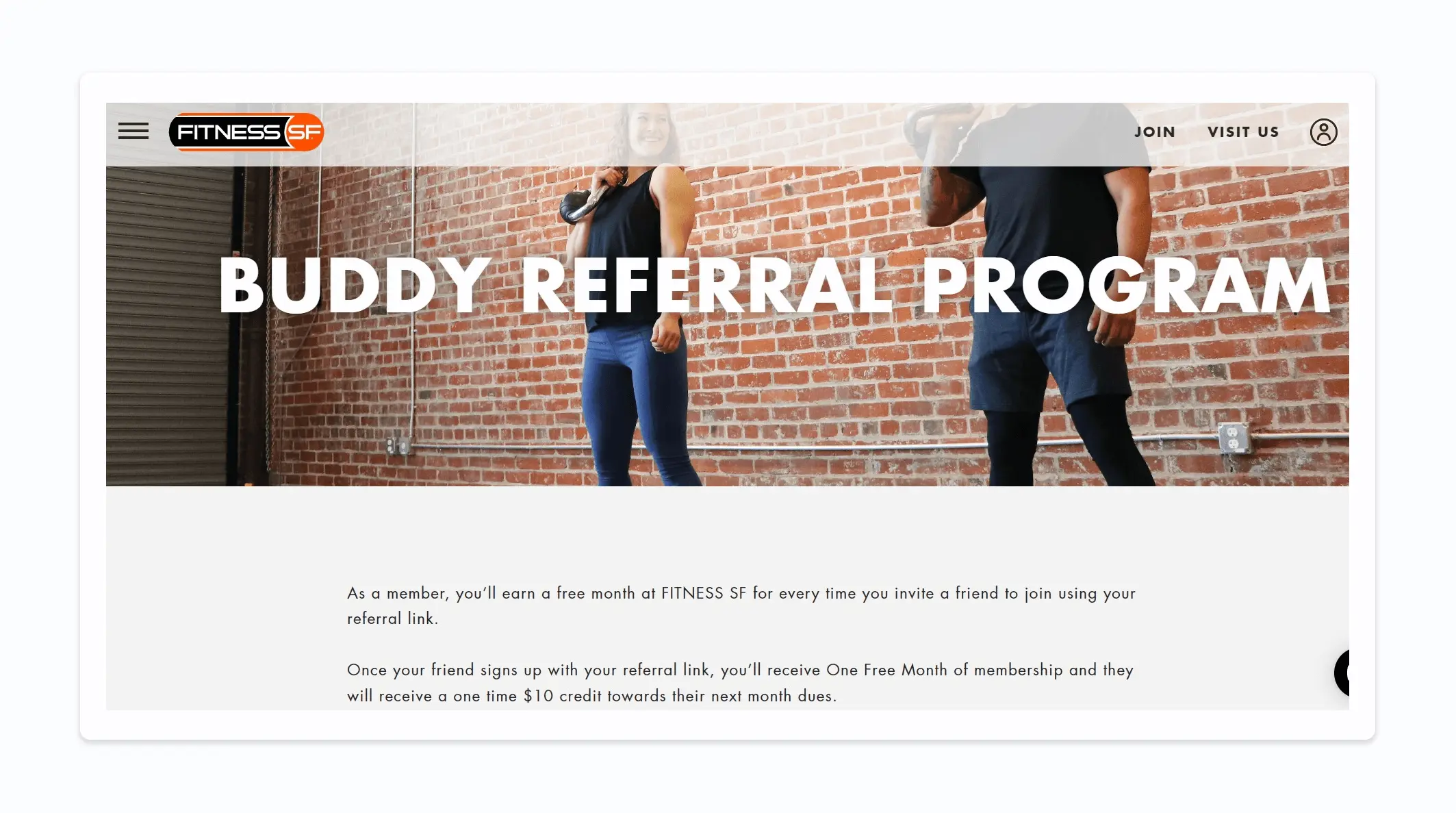
Fitness SF is a gym that offers a generous and easy-to-understand referral program. A member that invites someone to join gets a whole month of free membership, while the referral gets $10 credit for their next month. The gym also has a straightforward three-step process that anyone can complete in a minute.
This program works really well because the incentive is huge for the person making the recommendation, as they get an entire month for free. But the gym ensures they remain profitable by giving a $10 discount on the second month for the referral, which increases the likelihood of them sticking around for longer.
Aloyoga
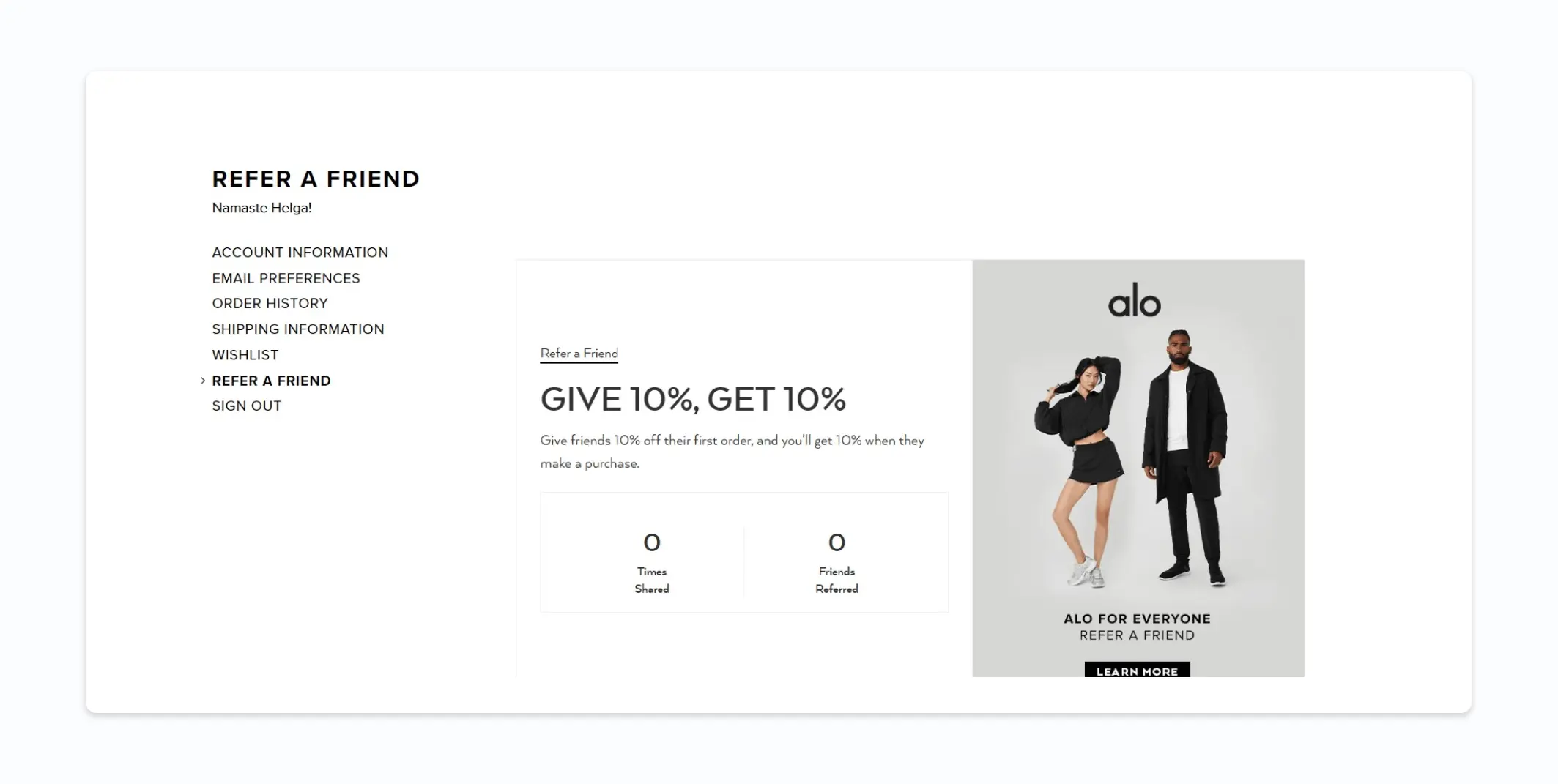
Aloyoga is an apparel store that utilizes a convenient referral program portal where customers can keep track of progress, grab the referral link, or even share with their friends via email directly through the platform. It also tracks information about the times shared and friends referred.
The reward itself also works well to keep both the referrer and the referral motivated. It's called "give 10%, get 10%", which means that for every referral, the person recommending gets 10% off their next order, and the referral gets the same.
Morning Brew
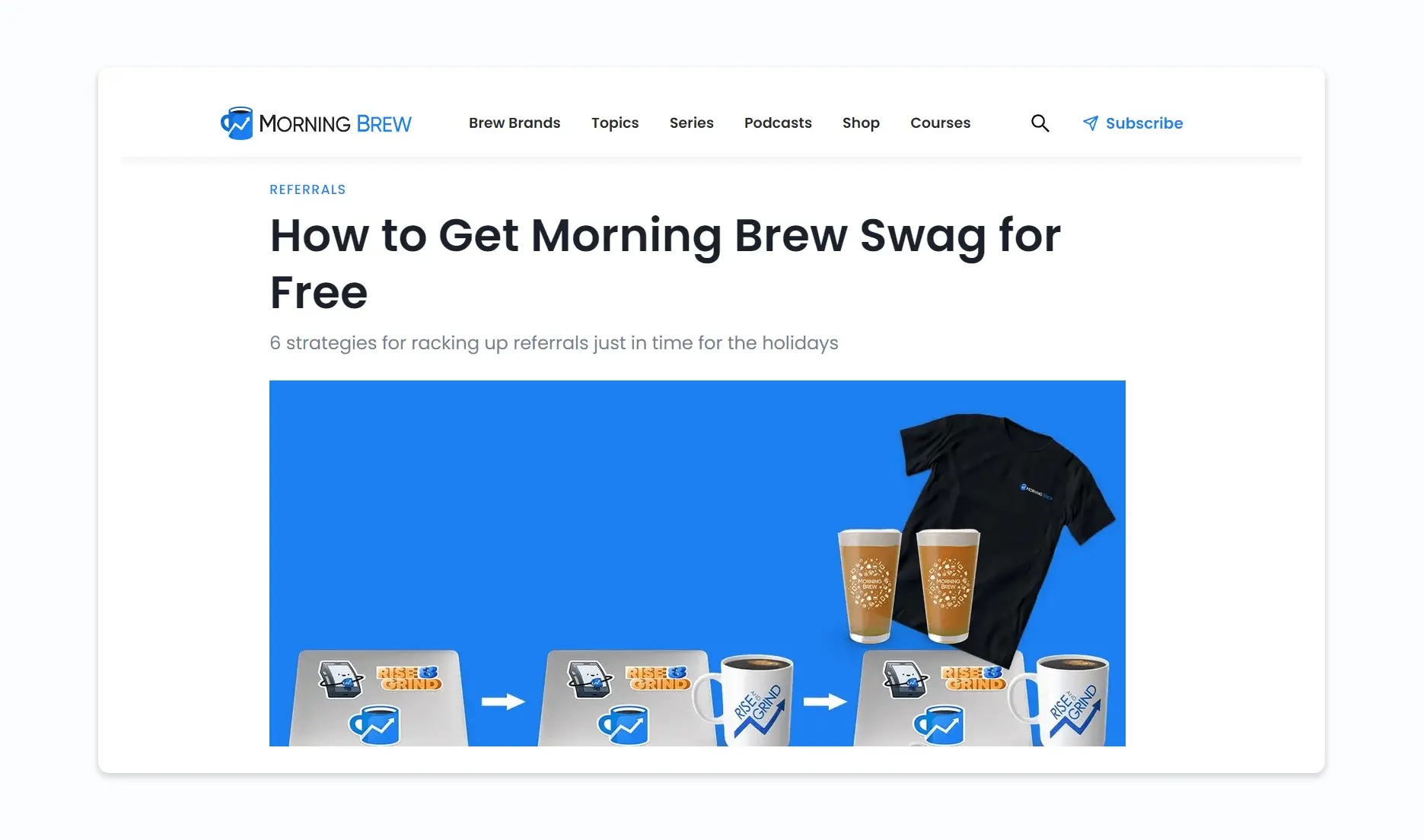
Morning Brew is one of the most popular newsletters today, with more than 1.5 million active subscribers. And what's even more impressive is that a staggering 25% of their subscribers have come through a direct referral.
The newsletter achieved incredible growth thanks to an ingenious way of setting up its referral program. Part of that is a milestone-based system, which allows people to redeem branded prizes based on the number of people they can refer. But at the same time, Morning Brew continually engages their subscribers with content and emails to encourage them to keep spreading the message.
Support Ninja
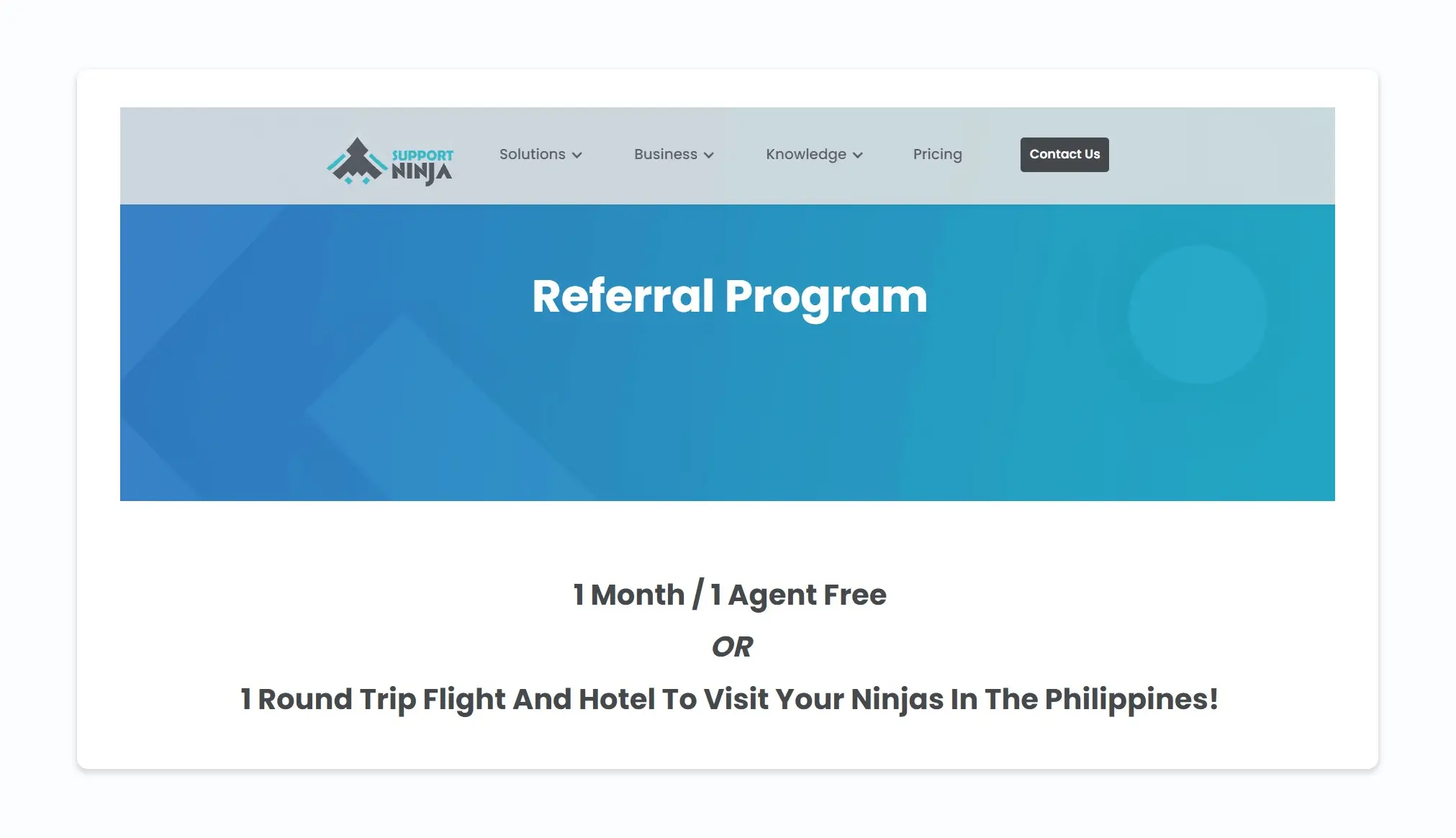
Many businesses fail to see results with their referral program because they're afraid to be bold with the incentives. But that's definitely not something you can say about Support Ninja, a customer experience and support service based in the Philippines.
For those who invite a referral who signs a one-year contract with three or more agents, the company promises either a 1-month/1-agent for free or a round-trip flight and hotel to visit the support team in the Philippines.
SupportNinja also has a simple three-step process, provides an email template, and offers support to help guide their referrers.
SwagBucks
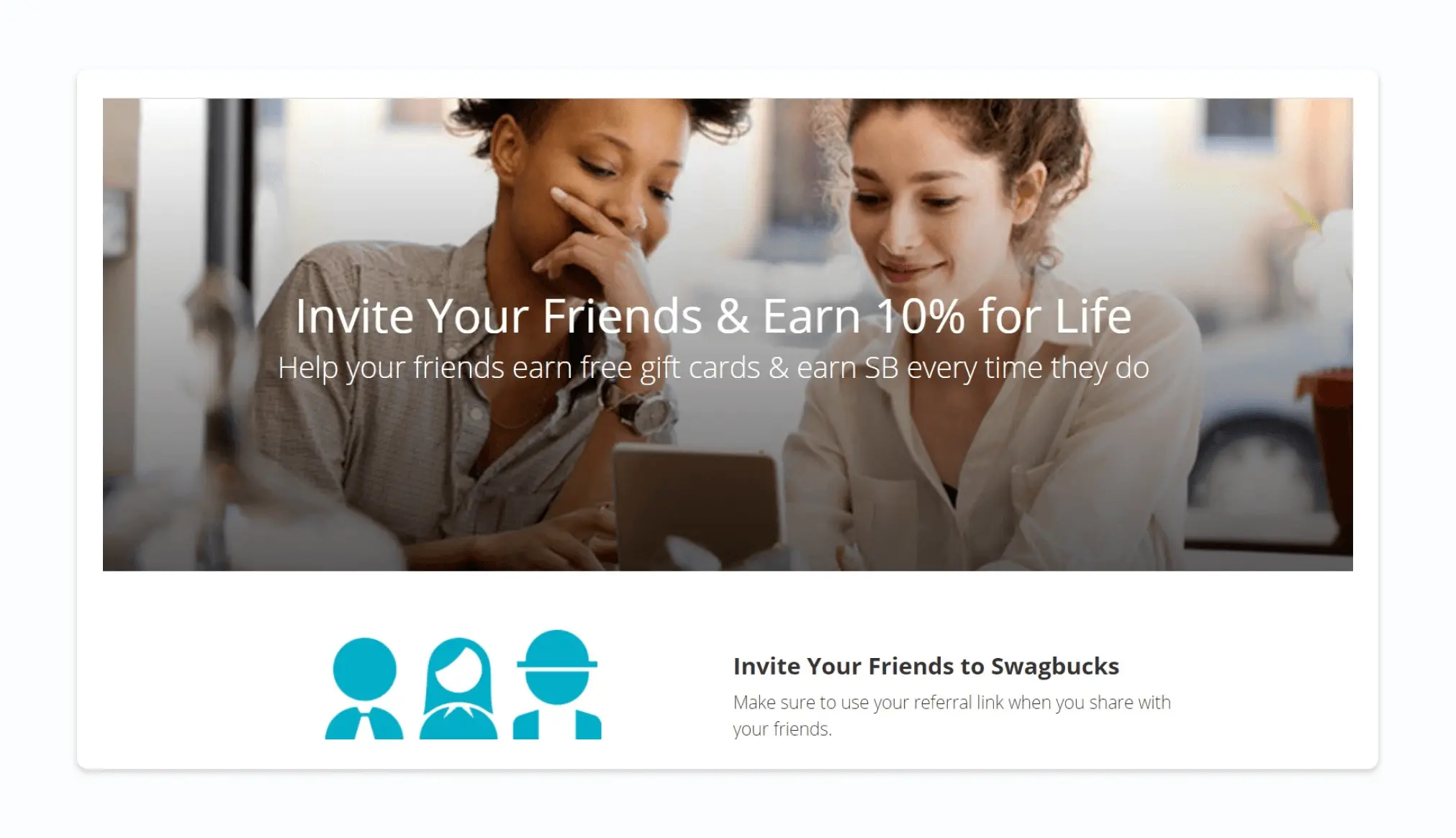
SwagBucks is a business that rewards its customers for various actions they do online, such as shopping, watching videos, playing games, or completing surveys. Users can collect SwagBucks and exchange them for Amazon, Walmart, and other gift cards.
With gift cards already built into the business, it's no surprise that SwagBucks has an effective referral program as well. But the company adds a nice twist that provides extra motivation for people to invite their friends.
Instead of offering free gift cards, the company provides 10% of whatever the referral earns in SwagBucks. That means that a person can earn SwagBucks on autopilot forever if they bring in a few active customers, getting free rewards indefinitely.
Bottom Line
A referral program might not be the first thing most businesses consider when building their audience. But when set up correctly, it can become the single most powerful driving force for growth.
Leveraging the right tools and expertise can help you launch your referral program for small businesses and significantly boost your chances of success.



